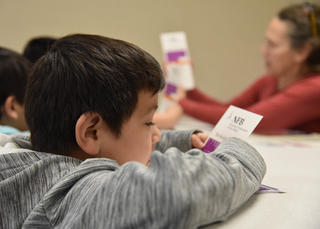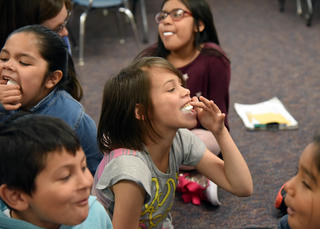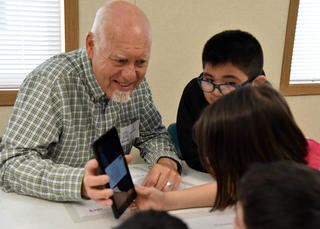
A student tries to zip up his coat while wearing bulky gloves during the IDEA fine motor skills activity
A group of Columbia Elementary 5th graders fumble with bulky gloves as they try and zip their coats, others attempt to read wavy moving letters on an iPad, across the room two girls try and write a sentence while only looking in a mirror, others struggle to say what they ate for dinner while holding a marshmallow in their mouths. These challenging experiences might sound fun, but for many, they represent the reality of what it’s like to live with a disability.
The IDEA Project, a program that introduces students to what it's like to have different abilities recently visited Columbia Elementary for a week-long, school-wide disability awareness program. The program includes experiential learning activities that simulate different types of disabilities such as sensory processing issues, communication delays, and physical impairments to enhance their understanding and encourage empathy.
The IDEA Project is a non-profit organization -501(c)(3)-that provides interactive disability education awareness in schools. With custom programs tailored to each grade level, the goal is to create understanding and empathy by educating students about differences and different abilities.
The Project’s disability awareness program consists of an interactive 40-minute group assembly which includes an inspiring video showing children with different abilities doing things others might not expect them to do, followed by interactive station activities for students to rotate through.
The IDEA Project was started by Wenatchee native Allison Bureau, the mother of a child with special needs. When her son, Wyatt, started elementary school, he used a tablet computer to help him communicate. After witnessing the other students' confusion as to how to include Wyatt, Allison asked to come to talk to Wyatt's class about his differences. She spoke to students about differences and different abilities, showed a video of Wyatt doing things the other students might not think he could do, and led an activity that simulated what it is like to have speech difficulties. After observing the students' improved understanding of Wyatt and his difficulties with speech, she decided to create a disability awareness program. Bureau now lives in Western Washington and travels around the state to schools delivering the IDEA program.
Parents, educators, and even the students with disabilities that go through the IDEA experience have a profound reaction. At a recent school visit, Bureau recalled a girl with dyslexia leaving in tears. “She was crying happy tears when she left because she finally felt like her peers understood her for the first time in her life,” said Bureau. “She was like Wonder Woman— She could actually read the waving moving words during the activity and the kids in her class were amazed!” Other examples include parents and educators developing a deeper understanding of a child’s disability through experiential learning. “I can’t tell you how incredible it is to see and hear a parent that has a child with a disability experience what it’s like for them when they volunteer to help run an IDEA activity – Their whole world changes.”




/WSD-horizontal-logo-small-RGB.png?mask=1)